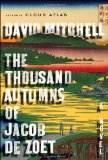Book Review: “The Thousand Autumns of Jacob de Zoet” by David Mitchell
June 28, 2010
At the dawn of the 19th century, a group of ragtag, conniving Dutchmen working for the East India Company make up the only westerners that can even steal glimpses of the forbidden Japanese Empire. From a tiny, walled island called Dejima outside of Nagasaki, the handful of Europeans trade and cheat, maximizing profits from copper, camphor and other Japanese goods while occasionally inadvertently enriching the East India Company as well. This is the world David Mitchell drops us into at the outset of The Thousand Autumns of Jacob de Zoet, his human-driven, beautiful new historical novel.
Jacob de Zoet, a straight-laced, naive and hopelessly optimistic young clerk, arrives, charged with visions of making honest men out of the smugglers, clockwork clarity out of a mess of cooked books. This of course is an immediate recipe for farce; de Zoet is about as popular as a fart. What he does accomplish, almost immediately, is falling for Orito Abigawa, the winsome (if facially scarred) daughter of a local gentleman. Orito is graceful, elusive, and somewhat implausibly educated in the nascent medical arts. Her studies of early anatomical texts and medical tomes, guided in part by a riotous, crotchety doctor stationed at Dejima, serve as an excuse for her passable knowledge of Dutch. de Zoet and Orito can, at least, converse.
Things start going (predictably) badly. de Zoet makes inevitable enemies, Orito disappears. An earthquake. The East India Company men while away the non-trading season ominously, drunkenly, hurling various abuses at their motley group of slaves. The shogun starts clamping down on trading and tributes.
Interactions on Dejima, whiz-bang linguistic mashups of formal Japanese from inflexible state translators; rough-and-tumble, sea-salted Dutch vernacular; Indonesian pidgins;—these seem convoluted, yet they’re so plausible that for a while we forget this is fiction. The man-made island reverberates with drama, feels like a stage set, even comes with a sketched, maplike overview nominally penned by de Zoet himself.
On Dejima, there is a slight surreal quality to the tininess of the space, the prison-like existence. But the story is solid and present, with none of Mitchell’s hallmark, Murakami-evoking magical twists. The Thousand Autumns is not as dreamy-sweet as his novel Black Swan Green but does have its woozy moments. And then there is the dark mountaintop fortress-abbey where ninjas lurk on crags, a supernatural cat wanders around, and some Very Bad Things are going on. It’s there that things start getting peculiar.
Mitchell’s past creativity with structure, like the nested, folded-in-on-itself triumph, Cloud Atlas, has left him open to accusations that he avoids serious writing by using the literary equivalent of smoke and mirrors. Lest you think that Mitchell is hiding behind novelty, The Thousand Autumns is stripped clean; it is a novel so true to form that it evokes a certain 19th-century nostalgia. Maybe we are reading Tolstoy. That is how it seems sometimes, with its straightforward, non-fidgety energy.
Sometimes this energy wanes just a notch. The novel doesn’t gallop; it has self confidence and doesn’t cut its scenes short. Think of it as the director’s cut, with specific pride around the dialogue’s subtleties. But neither does it thrash or go frantic. It has a gentle texture that beckons the reader on, even if the pace isn’t entirely on fire.
There’s the weirdness of the walled garden trading island of Nejima, the even deeper weirdness of the mountaintop abbey, the odd juxtaposition of Dutch and Japanese cultures. But all that is strictly irrelevant; the novel would stand on its own just for the nuanced relationship between de Zoet and Ogawa, de Zoet’s rival for Orito’s affection. Or the internal monologue of the gout-plagued, conflicted English captain who arrives to impose the distant British triumph over the Dutch. Or the wicked Abbot Enomoto’s tireless machinations.
This is Mitchell coming into his prime, still able to wield the weird, but comfortable enough in his milieu to start framing up some serious, timeless literature.
LibraryThing Early Reviewer Program
My many thanks again to LibraryThing for their Early Reviewer program, as well as Random House. The Thousand Autumns of Jacob de Zoet will be released in the United States on June 29, 2010.
One Comment
Get the Book!
Buy the books mentioned in this post from Amazon.com now and help me maintain my rock 'n roll lifestyle.
Related Posts
- Reading: 2010 in Review; 2011 Goals
January 9, 2011 - Book Review: “Work Song” by Ivan Doig
July 8, 2010 - Book Review: The Wind-Up Bird Chronicle by Haruki Murakami
August 11, 2008 - Book Review: “Adam and Eve” by Sena Jeter Naslund
September 23, 2010 - Book Review: “Half Moon: Henry Hudson and the Voyage that Redrew the Map of the New World” by Douglas Hunter
December 21, 2009



As someone who puts CLOUD ATLAS comfortably in his all-time books list, I’m a bit wary that Mitchell is now deliberately writing to avoid criticism of cleverness, rather than writing to do what he does best. Not wary enough not to read this, mind.